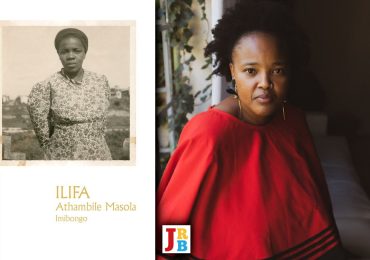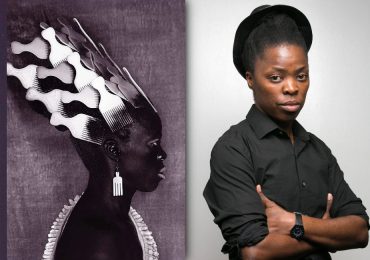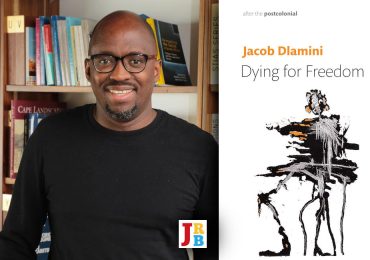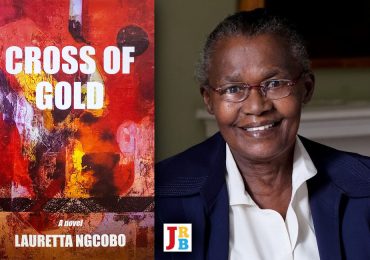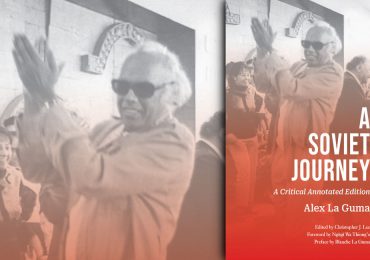The JRB presents an exclusive excerpt from Ghost Limb, the debut novel by Almini van der Merwe, which will be published in January.
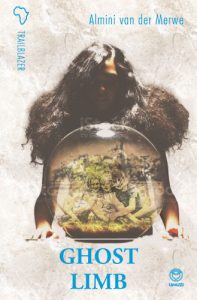
Ghost Limb
Almini van der Merwe
Penguin Random House, 2023
Chapter 1
DIE HOK
She lives at the periphery of thoughts like she inhabited the compartment at the edge of the backyard. ‘Die hok’, as she named it, ‘die hok’ as we came to call it, was positioned at the centre of a labyrinth: room, bathroom, stoepie, a small square yard sloping inward with a drain at the centre, the entire unit built, it seemed, from liberally slathered concrete. There was a partial cubicle wall that obscured it, connected it to the long corridor of the washing line which culminated in the larger concrete yard. I always felt the backyard was shameful and never let my friends back there.
It was accessible through the kitchen washroom, which was seldom unlocked, or more directly through a ramshackle wooden gate (quite difficult to scale) behind the garage and a garden of neglected Christmas roses. Unlike the front of the house, with its large glass panes and marble pillars, and the front garden tended by the church’s workers, the backyard was a decrepit embarrassment. It was a concrete wasteland but for the weeds and dandelions sprouting from cracks in the barren slabs, the fruit from plum and fig trees rotting on beds of arid sun-scorched soil. In the winter, it rained so much the entire yard flooded almost to our knees. The ducks we kept would love it, the bleak terrain changed briefly into a pool.
however depressing that space, she ruled it supreme with music and smoke from an improvised braai that my mother incessantly, but to no consequence, complained made the laundry stink.I used to walk the long shadow of the washing line to her domain, treading audibly so I would never surprise her, feeling her eyes behind the window draped with a tattered sheet. The pounding of bare heel against concrete, an uncomfortable impact in the bones: the key was to keep walking. She sometimes held my brothers prisoner in there doing who knew what. In these blank excluded periods I only knew the indistinguishable shouts from arm-twists and roars of laughter. I’m convinced that even my father, the dominee, was afraid of her and her jutting chin.
For a while before she came, the room at the edge of our property must have stood vacant. It is too strange to think. The pastorie, like a few of the older houses in our neighbourhood with foyers and high ceilings, came with this archaic appendage. We referred to it then, quite unselfconsciously, as the bediendekamer or servant’s room, as if we were the young masters of a number of servants and as if a maid in south Africa in the late 1980s was the same as the servants in period pieces.
We’d had a series of maids in our early childhood, coloured women sent by my mother’s people on the farm. In Afrikaans the word was ‘meid’, and that’s what they were called, though not by us (such crude language wasn’t in our repertoire), although we must have shared the sentiment. None of those maids lasted long enough for me to remember much. There is the worn-out face of an old woman bathing us, and a few of their names return: Sophie, Lydia, Netta with her soft kopdoekies that we tugged at to tease her. What I remember most about Netta, besides her soft threadbare headscarves, is what my parents declared after she disappeared: that she ran away. I couldn’t imagine why she would run away, and playing in the garden I sometimes thought I’d find her hiding in the bushes.
The day Johanna arrived marked a change. She walked in, and immediately we knew she would be different. She didn’t wear a kopdoek and spoke flawless Afrikaans in a white-person tone. She seemed more like a guest than a maid, a strange guest invited into our house to stay forever. She had the most unusual face: strikingly ugly, all protruding jaw and cheekbones (reminding me of the pterodactyl dinosaurs in my illustrated books), which gave her head the appearance of slanting backwards. As she stood in the foyer, her eyes surveyed us from the shadow of a prominent brow, next to which peaks of uncovered hair stuck out, clown-like, on either side. There was no ingratiating show of affection, no pretence for my mother. She appeared nothing but sullen, almost snobbishly so, prepared to do the job at hand and this in spite of herself.
These facts about her scared me. It seemed she would disrupt our playing. She was not someone to go ignored. We hid behind the tea trolley when my mother called for us to come out and say hello. We would pay for that reluctance later.
~~~
- Almini van der Merwe studied English literature at Stellenbosch University (BA in Language and Culture), followed by an honours degree in English Studies, then joined the Creative Writing programme at the University of Cape Town in 2009, where she was mentored by Stephen Watson. She has worked as an editor, copywriter and translator, and is currently living in Liechtenstein, working on her second novel while raising twins.
~~~
Publisher information
It’s the late eighties in Strand, a small coastal town southwest of Cape Town. When Johanna, a new maid, arrives at the home of a dominee’s family, nobody imagines that she will capture the family in her web of emotional complexity. The narrator daughter develops an ambivalent friendship with the new recruit but Johanna remains an enigma. She is at once mercurial and full of fun, playing children’s games and making mischief, but also has periodic rages, throwing bricks and abusing animals—and eventually turning on the children.
After her arrival, Johanna joins a pack of roving neighbourhood children that includes the daughter and her brothers. Together they find a form of belonging and imaginative outlet in the stifling religious community. But when a shift in the political landscape precipitates a change in family life Johanna is in danger of being left behind. With her place in the household and neighbourhood increasingly uncertain Johanna draws the narrator into a scheme where domestic tensions threaten to explode.
Later in life, the narrator finds herself haunted by the mysterious fate of a woman who seems a part of her. Emotionally charged and poignant, Almini van der Merwe’s first novel is a meditation on the mutability of memory and guilt and of the consequences of reality denied.

